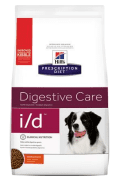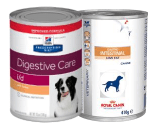Pancreatitis
The pancreas in an organ which lies in the folds of the small intestine. One of its functions is to produce digestive enzymes to break down fat and sugars in the intestine.
When the pancreas becomes inflamed, these enzymes leak out onto the pancreas and begin to digest pancreatic cells. This causes a whole body inflammation, which can affect the intestinal, liver and kidney enzymes in time. The secretion of digestive enzymes is stimulated by food and water or by increased gastric acid.
Signs of Pancreatitis are:
- Lethargy / depression
- Not eating
- Vomiting
- Watery diarrhoea (sometimes bloody)
- Dehydration
- Tender abdomen
- Walking hunched up (secondary to abdominal pain)
- Yellowing of gums / whites of eyes (jaundice)
Cause of the Disease:
There are many theories on the cause of Pancreatitis. Usually it is associated with rapid changes in diet, getting into garbage, eating unusual food (table scraps), or taking certain types of medications. Pancreatitis may occur in both dogs and cats. It is more common in Miniature Schnauzer, Miniature Pinscher and Cocker Spaniel dog breeds and the Siamese cat breed. It is more common in females then males. Pancreatitis can reoccur in an animal’s life. It can become more severe causing chronic damage and destruction to the pancreas. If untreated, acute pancreatitis can cause severe dehydration, infection of the abdomen (peritonitis), liver and kidney disease and can be life threatening. Successive pancreatitis or chronic pancreatitis can cause enough destruction to bring on Diabetes Mellitus.
Diagnosis:
Since there are many diseases that can cause symptoms similar to pancreatitis (e.g. liver disease, kidney disease, infectious disease, intestinal disease…), your veterinarian may suggest the following diagnostic tests:
- A complete blood count and chemistry will help your veterinarian to determine if there is infection, disease of the kidney, liver, pancreas or metabolic disease present.
- Urinalysis: This will allow your veterinarian to assess the kidney’s ability to concentrate urine and expel toxins as well as check for urinary tract infections.
- Ultrasound: An abdominal ultrasound helps to image the pancreatic region and see if there is evidence of infection, abscessation, or cancer.
- Surgery / exploratory laparotomy: If the pancreas begins to form abscess, obstructs the gall bladder, or may need peritoneal lavage may help to decrease the inflammation in the abdomen, then your veterinarian may suggest a surgical exploration.
Treatment: treatment of pancreatitis is focused on:
- Keeping food and water away from the animal (NPO): Eating and drinking can cause continued production of pancreatic enzymes making the inflammation worse. While the animal is being treated for this disease in a hospital setting, food and water are generally not started again until vomiting decreases and pancreatic enzyme levels decrease as well.
- Diet: Hills Prescription Diet i/d and Royal Canin Gastro-Intestinal Low Fat food are highly digestible formulas created specifically to help manage dogs with gastrointestinal disorders. There are several types of gastrointestinal disorders, including colitis, constipation/diarrhoea, gastroenteritis and pancreatitis.
- Fluids: Fluid therapy, to maintain hydration and to support the pancreas to heal and stop producing the pancreatic enzymes causing the initial inflammation.
- Drugs which decrease acid production: Drugs help to decrease stomach acid and hence also decrease pancreatic secretion.
- Antibiotics: When indicated to help treat secondary infection caused by pancreatitis
Please contact us immediately if:
- Your pet begins to vomit, have diarrhoea or stops eating
- Your pet has increasing abdominal sensitivity
- Your pet begins to become dehydrated, lethargic or listless
- There is any change in your pet’s health


